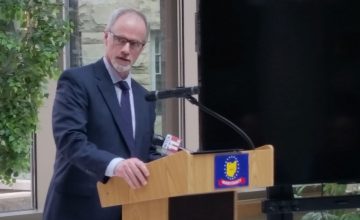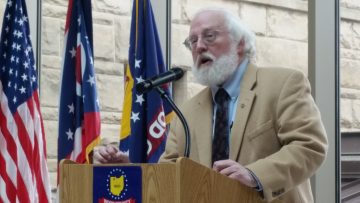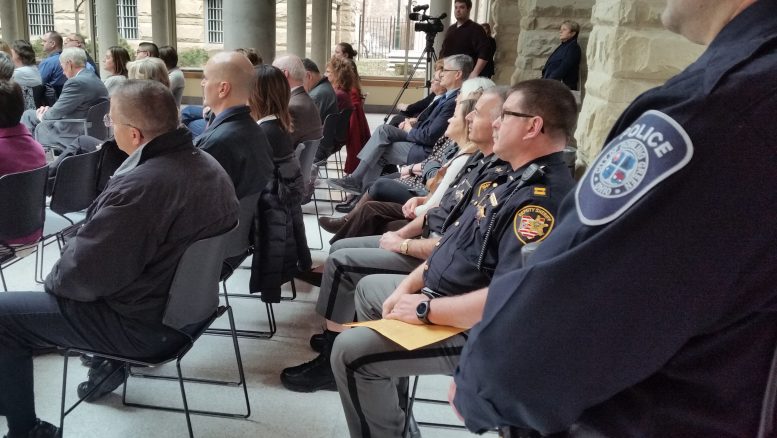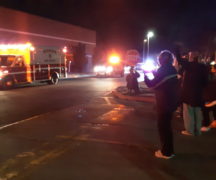By JAN LARSON McLAUGHLIN
BG Independent News
Those being honored Monday in the war against opiate abuse weren’t front and center. As usual, they were gathered far from the podium.
“The first responders are all in the back of the room,” Wood County Prosecuting Attorney Paul Dobson said. “Frankly that’s where they would prefer to be. They would much rather be out doing their jobs.”
Those are the jobs they were being honored for on Monday – saving people from opiate overdoses.
“They step into circumstances that we can’t imagine,” Dobson said. “They stand between us and danger in a very real sense on a daily basis.”

Wood County Prosecutor Paul Dobson
EMS and law enforcement are being recognized across Ohio this week for saving people who overdose on opiates. In the Wood County Courthouse Atrium, the first responders were thanked by the second and third responders in the opiate crisis.
To show appreciation in Wood County, that meant lunches will be delivered to fire and police stations throughout the week by Wood County Alcohol, Drug Addiction and Mental Health Services, and the National Alliance on Mental Illness.
“This is basically to say ‘thank you.’ We know it’s difficult work,” said Milan Karna, with the Wood County Prevention Coalition.
A video was played, showing people who had been saved by first responders using narcan to revive them after overdoses. The faces thanked the first responders for not giving up on them – even if they had to respond to the same person for multiple overdoses.
Tom Clemons, WCADAMHS director, used Dobson’s terminology of this war on opiates creating “refugees” in need of care.
“It takes all of us working together on this,” Clemons said.
On the front lines of this war are EMS, law enforcement, children’s services, and hospitals.
“It is a widely recognized fact that a lot of first responders are putting themselves at risk,” with fentanyl being very dangerous to those treating overdose victims.
But the use of narcan is giving opiate addicts another chance at life, Clemons said.
“We’re seeing more and more people’s lives saved,” he said. “That’s where recovery begins. Treatment does work and people recover.”

Tom Clemons honors first responders.
Evidence of that is seen with the county’s new Addiction Response Collaboration program through Dobson’s office. Since its inception about four months ago, the program has worked with 35 opiate addicts in Wood County. Of those, seven people have been sober for three months, and three have been sober for four months. That is a good retention rate, according to ARC’s Belinda Brooks.
“I don’t think there’s an EMS or law enforcement in the county that hasn’t seen something” of the opiate epidemic, Brooks said.
Wood County Sheriff Mark Wasylyshyn said his deputies had another save from an overdose this past weekend. He also said it’s not uncommon for the county jail’s holding cells to be doubled up with people detoxing.
“I never would have thought I would be carrying narcan in my pocket,” he said, showing the small nasal injector.
Wasylyshyn acknowledged that some people are critical of first responders making multiple rescues of the same addicts. “Why do you want to save them,” they ask. Simply because all of them are someone’s son, sister, mother, grandson, the sheriff said.
“Gee, maybe you should only save them so many times,” some people have said to the sheriff.
“I don’t think we want to go down that path,” Wasylyshyn said. “No one chooses to be an addict” and have drugs control their lives.
First responders were recognized by proclamations shared by State Senator Randy Gardner, State Rep. Theresa Gavarone, both R-Bowling Green, and Wood County Commissioner Doris Herringshaw.
“We know that without you, we would not continue to have lives saved like we do,” Herringshaw said.
And Doug Cubberley, administrator at Bowling Green Municipal Court and chairman of the WCADAMHS Board, stressed that every community has been touched by the opiate crisis – but added that first responders offer hope.
“Treatment works and people do recover,” Cubberley said.





